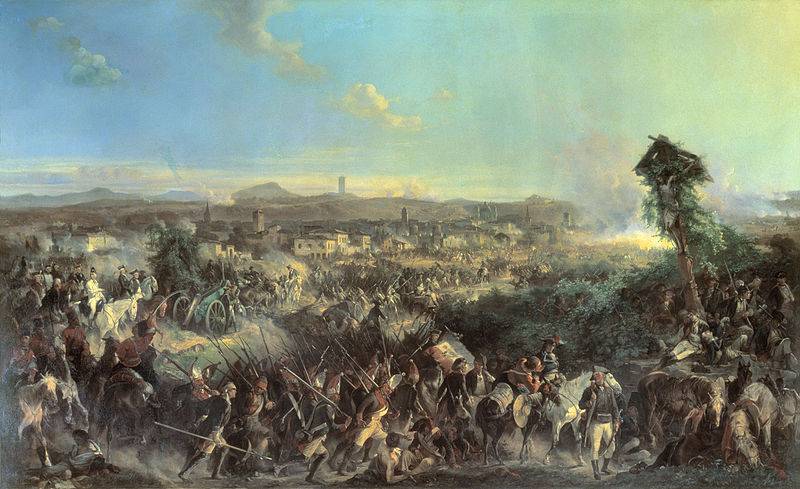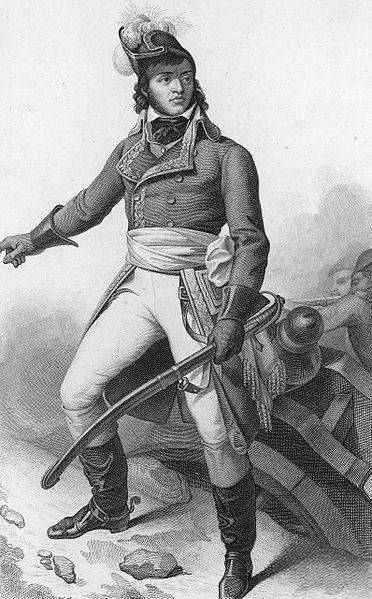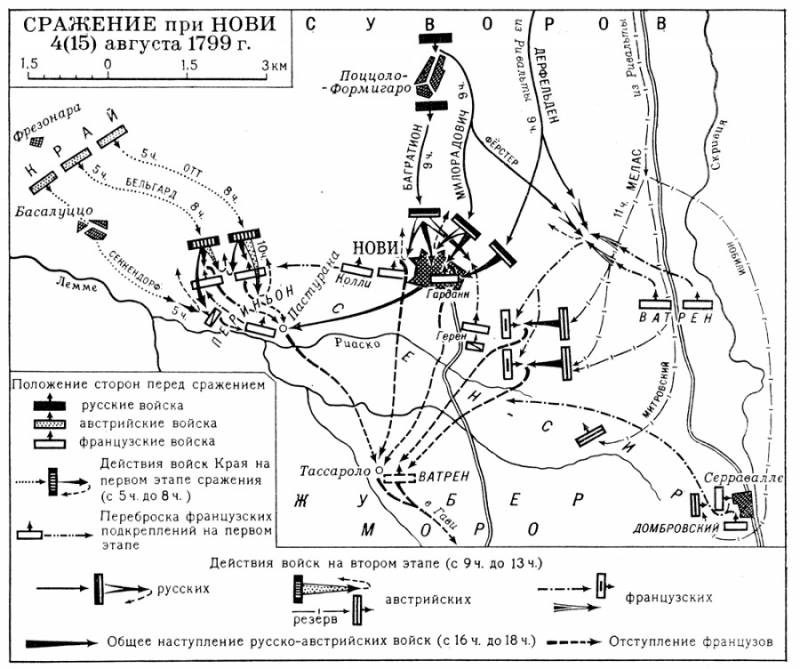220 years ago Suvorov defeated the French under Novi

Almost all of Italy was freed from the French, and the Austrian government hastened to get rid of the Russians. Great Britain, concerned about the successes of the Russian army and fleet, also desired the removal of Russian forces from Italy. The Italian campaign was completed, and the Russian miraculous heroes of Suvorov were thrown into Switzerland.
The general setting
Ushakov squadron successfully operated in southern Italy. The Russian squadron headed for the Kingdom of Naples, occupied by French troops. The garrison of Brindisi fled without a fight. Then the Russian naval commander landed under the command of Lieutenant Commander Belly at Bari. Attaching several thousand Calabrian rebels to himself, Belli's detachment crossed Italy and went to Naples. The French troops that had come forward were defeated. The Russians took Fort Villeno, covering the approaches to Naples. 3 June fell Naples. The Italian monarchists began repression against the Republicans, but the Russian sailors stopped the reprisals.
The landing of Russian troops and their successful actions contributed to the growth of the national liberation movement. Locals warmly welcomed the Russians and created militias for a joint struggle with the invaders. At the request of the British and the instruction of Suvorov, Ushakov sent Rear Admiral Pustoshkin’s detachment to besiege the city of Ancon, on which the French troops of MacDonald and Moreau relied. Ancon was blocked and an Austrian detachment approached the fortress under the command of Freilich. The actions of the Ushakov squadron ended with the landing for the occupation of Rome. The successes of the Russian sailors in southern Italy contributed to the actions of our forces in northern Italy.
After the defeat at Trebbia, the French army retreated to the Genoese Riviera. The Austrians did not give the Russian commander in chief to finish off the enemy. Hofkrigsrat banned offensive operations until the surrender of Mantua, which was besieged by the Austrian Corps of the Region. Suvorov located the army in the region of Alessandria (Alexandria). Under his command there were about 40 - 50 thousand people. About 25 thousand soldiers were located at the borders of Savoy and Switzerland, 5 thousand people - at Tuscany and 30 thousand troops besieged Mantua. The Russian commander was preparing an offensive with the goal of completely defeating the French in Italy. However, the Austrian high command demanded that he first of all focus his efforts on the capture of Mantua, and other citadel fortresses - Alessandria, Tortona, Koni, etc. As a result, a whole month passed in inaction. This annoyed Suvorov very much, and he did not hide his anger. His relationship with the Austrian leadership finally deteriorated.
Party plans
The Austrian gofkrigsrat (the highest military council) tied the initiative of Alexander Suvorov. He was forced to postpone the offensive. On 2 on July 1799, he developed the first offensive plan. The Russian commander was planning to enter Tuscany and Rome to establish contact with the fleet. The second operation to occupy Genoa and the third - Nice. In July, the Alexandria Citadel and Mantova were captured, Fort Serravale was captured. This changed the situation at the front and made it possible to concentrate efforts on the main line. The freed Corps Corps reinforced Suvorov's army.
19 July, Suvorov introduced a new plan. He planned before winter to take Nice and the chain of the Savoy mountains. Going to Genoa via Novi and Aqui, then from Genoa to Nice - meant to lead a difficult mountain war. Therefore, the Commander-in-Chief proposed to advance through the Tend Pass to Nice to cut off the French in Genoa and force them to leave the area and, if successful, cut off the enemy’s escape route. In accordance with this plan, regrouping of troops began. Rebinder’s corps arrived to Russia, which allowed them to assemble a powerful offensive group. The corps was led by Rosenberg. The main forces of the army (over 51 thousand people with 95 guns) were located between Alessandria and Tortona. Alexander Vasilievich intended to speak on 4 on August 1799. However, on 30 on July he received information about the French army’s performance under the command of Joubert, whom the Directory appointed together Moro and MacDonald.
Taking a break, the French came to their senses. Due to the heavy defeats that the French troops suffered from Suvorov, the loss of northern Italy, the Italian theater became the main thing for Paris. The French government had to take emergency measures to protect France from invasion. It was planned to form a new army for the defense of the Alps from Savoy and Dauphine. The directory created a new Italian army (about 45 thousand people) from the remnants of the armies of Moro and MacDonald, sent reinforcements. Moreau was ordered to launch a counterattack and defeat Suvorov’s army, regain control of northern Italy, and lift the siege of Mantua. Moreau, reasonably considering this task impossible, planned to act on defense, closing mountain crossings from Italy to France. For this, there was enough strength. However, the Directory did not like the defensive strategy. Moro removed. The young, talented General Barthelemy Joubert, a participant in the Italian campaign of Napoleon, who was considered one of the best commanders of the republic, was appointed the new commander in chief.
The French commander went on the offensive. Joubert had erroneous information that the Russian-Austrian troops were scattered over a wide area and was going to break them with a sudden blow of concentrated forces. The French moved in two columns. The French were going to attack the Russians at Tertz, but they were not there. Continuing the movement, the troops of Joubert on 2 of August reached the boundary of the Lemme River. Francoville had the left French flank, Serravalle had the extreme right. The French had to go down to the plain, north of Novi, in order to fight the Russians. However, when the French army descended from the mountains, the French commander in chief found that he had made a major mistake. Superior Allied forces awaited the enemy in well-trained positions. Potsolo Formigaro was the vanguard of Bagration and Miloradovich, a few miles, at Rivalta - the troops of Melas and Derfelden, on the river. Obre is the Austrian corps of the Land and Belgard, and in the rear of Tortona - the Rosenberg Corps.
Attacking the allies on the move was suicide, and shamefully stepping back, in front of the enemy. Almost all generals offered to retreat to Genoa. Joubert refused, but doubts remained. The French army regrouped and prepared for defense in strong positions. They occupied the last spurs of the Apennines, between the valleys of the rivers Skrivia and Aubrey. The terrain was elevated, rugged, convenient for defense. The city of Novi had stone fortifications. True, the escape routes were difficult, the rear was cut by rivers and ravines. On the left wing near the village of Pasturan were the divisions of Lemoine and Pear, behind them there was a reserve - the divisions of Klozel and Partuno (17 thousand soldiers). The center of the position was occupied by the Labusier division, the Cauchy brigade and the Watren division (12 thousand people). On the right wing were the divisions of Saint-Cyr, Gardanne, Dombrowski and reserve. In total, the French army numbered about 40 thousand people, it occupied the front in 20 km. An important role was played by the city of Novi, through which the escape routes passed.
Suvorov at this time was preparing for active defense. The advance detachments were to conduct reconnaissance in battle and retreat in front of superior forces, luring the French into the valley. The vanguards of Rosenberg and Derfelden were given the task of resisting the French at Vigitsolla and Rivalta. All other troops were located in the depths of the position and acted on the basis of the movement of the enemy, striking from the front and bypassing. Thus, the advanced units had to start the battle, determine the intentions of the enemy, then the main forces came into action. Suvorov’s troops were located echelons in depth, which made it possible to introduce new forces into the battle as necessary.
The Russian commander in chief, making sure that the enemy did not dare to attack, ordered 4 (15) on August 1799 to launch a general offensive on Novi with troops from the left flank under the command of Bagration, Miloradovich and Derfelden. The strike group was to be supported by the reserves of Melas and Rosenberg. As a result, 32,5 thousand people were concentrated. The right flank, led by General Krai (17 thousand people) conducted an auxiliary operation, distracting the enemy in the direction of a secondary strike.

Battle
In the early morning of August 4 (15), General Krai struck the left wing of the French. The Austrians attacked from the march, while the rest of the Union Army at the beginning of the battle were out of sight of the French. This misled Joubert, who considered that he could defeat part of the Allied army before the approach of the main forces. Austrian columns squeezed the division of Lemoine and began to develop an offensive along the Lemme River. The French commander personally led a counterattack and was mortally wounded by a stray bullet, the army was led by General Moreau. He transferred the entire infantry reserve and part of the forces from the right flank (more than 8 thousand people) to the left flank. Having concentrated more than 20 thousand people here, the French stopped the Austrians, but thereby weakened the right flank, where Suvorov dealt the main blow.
At 8 in the morning, Suvorov’s troops struck the enemy’s right wing. Having ordered the Territory to resume the offensive on the right flank of the Union Army, the Commander-in-Chief moved the vanguard of Bagration and Miloradovich to Novi. Here the divisions of Gardant and Saint-Cyr defended. The French repulsed three attacks of Bagration, they were in the center much more than expected. During the third attack, Watren's French division descended from the mountains and attacked the left flank of Bagration. Russian avant-garde squeezed. Then Suvorov threw Derfelden's troops into battle. The French division was driven back and shackled by part of the fresh Russian-Austrian troops. After that, our troops personally led by Suvorov threw the enemy in the center until Novi. After a stubborn battle, the French retreated behind the city fortifications. The stone walls of the city withstood volleys of field cannons. They could not take the city on the move. The edge on the right flank could not advance.
At 13 hours, the Russian commander-in-chief suspended the advance until the reserves approach. After the approach of the units, Melas Suvorov ordered Krai to resume attacks on the enemy's left flank, Bagration, Miloradovich and Derfelden to oppose Novi, and Melas to strike the French on the right flank from Rivalta, bypassing the Watren division. Rosenberg was to take the position of Melas. In accordance with the instructions of the commander, the allies again went on the offensive. Melas moved slowly and only by 15 did he begin to cover Watren's right flag. Moreau could not prevent this, since all reserves were used on the left flank of the French army. True, Melas sent a part of his forces to Serrevalle, which weakened his strength. However, the general blow was so strong that the French could not stand it and began to retreat. By 17 hours, our troops had taken Novi.
The center of the French army was completely defeated. Watren’s division, which for a long time fettered the forces of the Allies, was surrounded and capitulated after stubborn resistance. The main forces of the French army on the left wing were threatened by encirclement and complete destruction. To save the army from death, Moreau gave the order for a retreat, which, under the simultaneous attack of the Allies from the front and flank, under artillery shelling, quickly turned into flight. Only part of the forces of Saint-Cyr was able in relative order to retreat to Gavi. The onset of the night saved the French from total annihilation. Both sides fought valiantly, but the victory went to a better-managed allied army. 5 (16) on August Rosenberg's reserve corps continued to pursue the enemy. During the retreat, the French suffered significant losses. However, the Austrians did not allow Suvorov to develop an offensive and finish off the enemy army in the area of Genoa. He was stopped.
The French army was defeated and, according to various estimates, lost up to 7 to 10 thousand people only killed, and over 4 thousand prisoners, 39 guns (all artillery of Joubert), the entire convoy and supplies. On 5 of August, during the persecution, several thousand French fled, deserted. Allied losses - according to various sources, about 6 - 8 thousand people killed and wounded. Most of the losses fell on the Austrians. Russian troops, despite the fierce battle in the center, when the French repelled four attacks, lost less than 2 thousand people killed and wounded.
The remnants of Moreau's army fled to the Genoese Riviera. The French could no longer even defend mountain passes. The Allies could effortlessly complete the completion of the liberation of Italy and create the conditions for an attack on France. However, Vienna did not use this opportunity (which ultimately leads Austria to a military-political disaster), fearing the growing influence of Russia in Western Europe. In France itself, the battle of Novi and the loss of almost all of Italy were the last straw for the Directory regime. In Paris, they made bets for how long Suvorov would reach the French capital. Soon, in the wake of hatred for the rotten regime through power, General Napoleon will come to power through a coup.
The Russian sovereign Pavel for Novi ordered that the prince of Italia, Count Suvorov-Rymniksky, be given to all the military honors even in the presence of the tsar, similar to those given to the person of His Imperial Majesty. The Sardinian king for the liberation of Piedmont marked the Russian commander with the rank of field marshal of the Piedmontese army, a grand of the kingdom of Sardin, with the hereditary title of prince and "brother" of the king. In England, the great commander was honored. Only in Vienna remained cold to this brilliant victory. The Austrian emperor and gofkrigsrat continued to send comments and reproaches.
The end of the Italian campaign
The battle of Novi was the last in the Italian campaign. Relations between the allies at this time deteriorated to such an extent that they decided to act independently. Austrians and British insisted on the removal of Russian from Italy. The Austrians had to continue operations in Italy, and Suvorov’s troops move to Switzerland. The Austrians in every possible way rushed our troops, while repairing obstacles at every turn, disrupting supplies. As a result, the Swiss campaign had to be postponed for two weeks. "Having squeezed out the juice I need for Italy, they throw me behind the Alps, and for a week now I’ve been more feverish from the poison of Vienna politics." - the great Russian man spoke about this.
Meanwhile, the Austrian Archduke Karl, who was in Switzerland, left there without waiting for the arrival of Suvorov, and left to the mercy of fate the Russian 30 thousand corps of Rimsky-Korsakov. This betrayal led to the defeat of the Russian corps. On 28 on August Suvorov’s army advanced from Alessandria on a new campaign.
Thus, despite all the intrigues of Vienna, Suvorov completed the task. He defeated the French army three times, a strong and skilled enemy, with brave soldiers and a brilliant general. Within a few weeks he liberated a vast country, captured and blocked all cities and fortresses. And all in the conditions that the Vienna court in every way interfered with the Russian commander. And Suvorov himself was 69 years old. However, he overcame all difficulties.
- Alexander Samsonov
- Italian campaign of Suvorov
Why was Suvorov in Italy
Italian campaign of Suvorov
Victory of Suvorov on the Adda River
Victories of the Russian army in Italy
"Lure!" How Suvorov destroyed MacDonald's army

Information